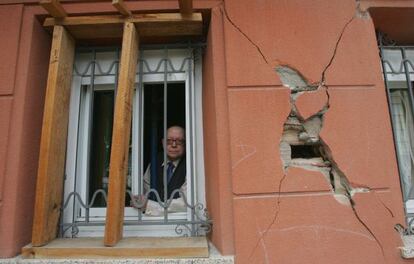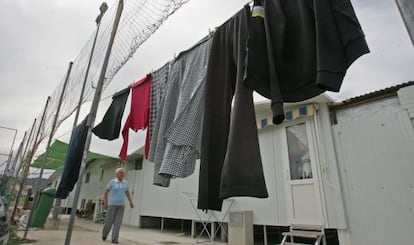Three years after Lorca earthquake, the wait continues amid the ruins
Less than five percent of those who lost their homes have been re-housed

Pedro Conesa has been unemployed for the last four years. He has two daughters to look after, and no income. He survives on charity. At the age of 53, he says he will probably never work again.
In many ways he is a symbol of the economic crisis that has gripped Spain for the last five years. But as if his situation were not bad enough, he also has the misfortune to live in Lorca, and along with 1,164 other families, lost his home in the 5.2-magnitude earthquake that hit this once-picturesque town in the southern region of Murcia on May 11, 2011, leaving nine dead and around 300 injured.
Three years on, barely 50 families have moved into new homes. Most people in Lorca say they feel betrayed, and that the politicians have broken the promises they made. Around €1.650 billion was promised to rebuild the town and re-house families, but barely half the money has materialized. The figure includes a €459-million fund created by a pool of insurers. Far from all of Lorca’s residents were insured.
For the last two years, Alfonso Serrano and his wife Antonia García are both in their sixties, and have been living in a 40-square-meter pre-fabricated hut with a tin roof put up by the Red Cross along with a dozen others on the outskirts of town; it is an oven in summer and a fridge in winter. Before that, they spent a year sleeping in a tent.
“Where has the aid money gone?”
Antonia Piñero and José Méndez are in their seventies. Three years ago, when the earthquake struck, they were sitting on a bench outside their house in the old quarter of Lorca, and watched as it fell apart. Three years on, they only have one question: “The money has come, but we haven’t seen a cent. Where has the aid money gone?”
It’s a fair question. Where is the €185 million that the European Investment Bank gave the regional government of Murcia for the rebuilding of Lorca? Why has the regional government not paid rent subsidies for two years when it was loaned €115 million by Spain’s Official Credit Institute?
Yolanda Muñoz of the regional government’s public works department blames the delays on red tape. Antonio Navarro of Lorca’s Socialist Party accuses the regional government of holding on to €21 million provided by Madrid. The regional government says it is continuing to raise new investment. “We have overcome the initial delays,” says Mario Garcés, under-secretary at the Public Works Ministry. “Rebuilding is going well despite the difficulties.”
But the city’s residents’ association disputes this claim. Spokesman Juan Carlos Segura blames the regional government for dragging its feet. He has organized protests in Madrid, as well as countering claims by the Popular Party’s Vicente Martínez-Pujalte that local people were responsible for the delays in rebuilding. He has also stood up to the head of the local property developers’ association who accused some local residents of spending their compensation on weddings. “In three years, nobody has resigned. The mayor is not on the side of the people of Lorca,” says Segura. His grandmother lost her home, and at the age of 92, is now dependent on her relatives.
They were poor before the earthquake: Alfonso was a hairdresser and his wife scraped a living selling lottery tickets. Their insurance policy paid out €71,000. The cost of building a new house will be at least €95,000, and they have used up all their savings. They say they may well end up living in their temporary home until they die. “We’re going to be here for a long time. They are all lying to us: the local government, the construction companies…” Her daughter is living in a hut next door with her own son.
In the hut on the other side lives Lidia González, along with her husband and two children. Her relatives are paying the €286-a-month mortgage on the property she lost in the earthquake.
The target of most people’s anger in Lorca is the Popular Party, which as well as ruling at the national level, also runs the municipal government, and in particular local Mayor Francisco Jódar. He came to office with an absolute majority in 2007, and remains in power, despite being blamed for the delays. Two years ago he suffered a stroke that has left him partially paralyzed. But he says he will fight on.
Murcia is the most seismically active region in Spain, and some of the medieval buildings that were badly damaged in the 2011 disaster may have been weakened by past earthquakes in the area, say scientists. The event was particularly damaging because it occurred at a relatively shallow depth, about 10 kilometers beneath the ground on which Lorca lies. Murcia’s fault line lies reasonably close to the subduction zone where Europe and Africa collide. The energy released in such quakes ultimately comes from the expansion of the Atlantic Ocean floor at the Mid-Atlantic Ridge. This expansion is pushing Europe in a south-easterly direction.
The destruction, and subsequent demolition work, has turned Lorca into an El Dorado for construction companies. More than 30 firms are bidding for rebuilding work, and 400 jobs have been created in the private sector.
The regional government has been less responsive. Two state schools, a health center used by a third of the city’s 94,000 residents, a sports center and a music school are still waiting to be rebuilt. More than 1,200 school students have to be bussed to colleges in surrounding areas every day.
That said, money has been made available to restore Lorca’s churches. The Public Works Ministry has invested more than €1 million in restoring two, while the Culture Ministry is spending €1.6 million on other religious buildings.
The center of Lorca has taken on the air of a movie set, with dozens of façades behind which lie piles of rubble, and no signs of reconstruction.

The perfect storm of an earthquake and an economic crisis has dealt a death blow to the local economy. Few of the town’s 700 stores and businesses are back on their feet. One shop owner says that on several occasions he went back into his store to try to recover some goods, risking his life in the process.
Jesús Pérez, a retired bank clerk now aged 76, spent around €9,000 on making his apartment habitable after the quake. Around him lie piles of rubble and rusty girders; outside, a huge crack runs past his window. The building is in sharp contrast to the new Civil Guard station house close by that was finished last year.
For many in Lorca who have lost their homes and their livelihood, the huge warehouse run by Cáritas has become a lifeline. Each month, volunteers hand out 700 shopping trolleys of food.
José Vélez, a 49-year-old unemployed delivery driver, comes into the warehouse with one of his three daughters, also without work. He has been a regular here for the last 18 months, and says he never imagined having to be dependent on handouts.
Tu suscripción se está usando en otro dispositivo
¿Quieres añadir otro usuario a tu suscripción?
Si continúas leyendo en este dispositivo, no se podrá leer en el otro.
FlechaTu suscripción se está usando en otro dispositivo y solo puedes acceder a EL PAÍS desde un dispositivo a la vez.
Si quieres compartir tu cuenta, cambia tu suscripción a la modalidad Premium, así podrás añadir otro usuario. Cada uno accederá con su propia cuenta de email, lo que os permitirá personalizar vuestra experiencia en EL PAÍS.
¿Tienes una suscripción de empresa? Accede aquí para contratar más cuentas.
En el caso de no saber quién está usando tu cuenta, te recomendamos cambiar tu contraseña aquí.
Si decides continuar compartiendo tu cuenta, este mensaje se mostrará en tu dispositivo y en el de la otra persona que está usando tu cuenta de forma indefinida, afectando a tu experiencia de lectura. Puedes consultar aquí los términos y condiciones de la suscripción digital.









































